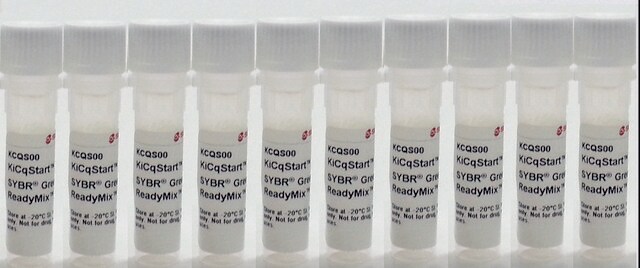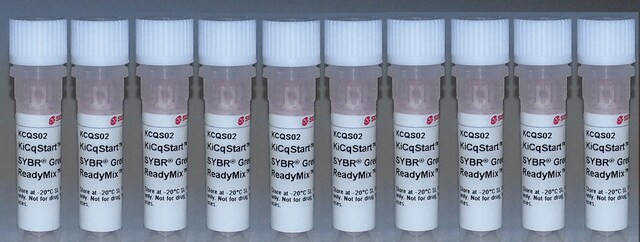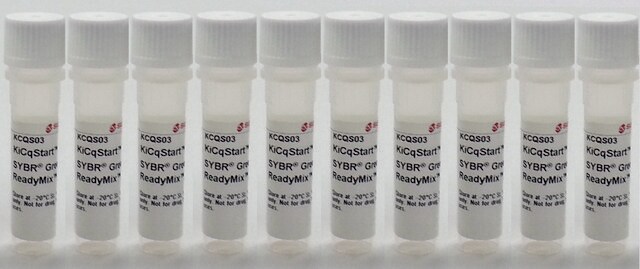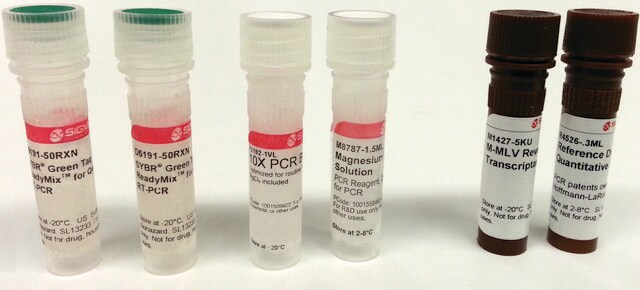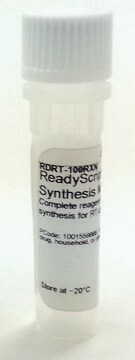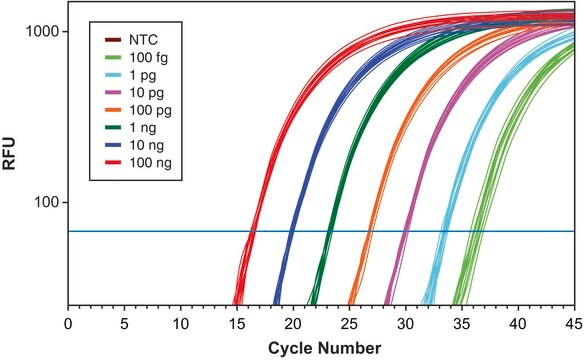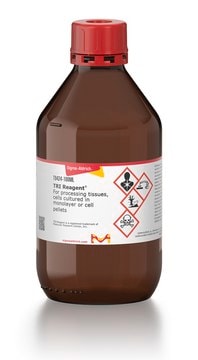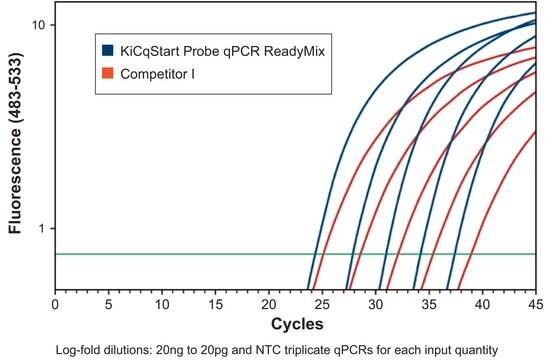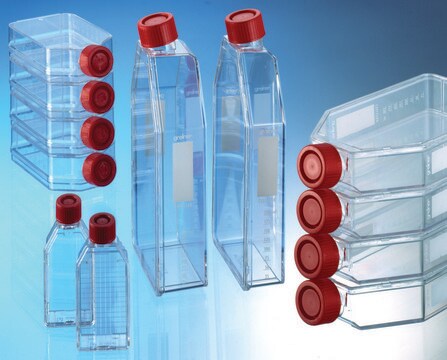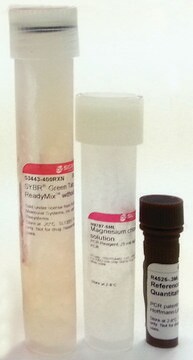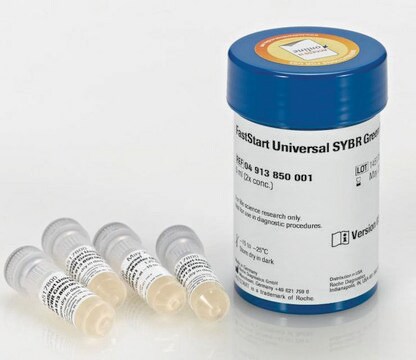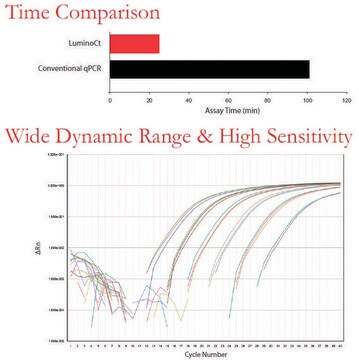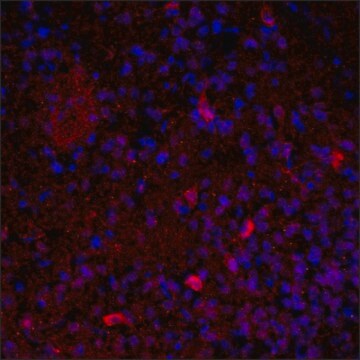KCQS01
KiCqStart® SYBR® Green qPCR ReadyMix™
Low ROX™, for ABI and Stratagene instruments
Sinónimos:
qPCR master mix, sybr green qPCR
About This Item
Productos recomendados
form
liquid
usage
sufficient for 1250 reactions
sufficient for 250 reactions
sufficient for 5000 reactions
feature
dNTPs included
hotstart
storage condition
protect from light
technique(s)
qPCR: suitable
color
colorless
input
purified DNA
compatibility
for use with ABI 7500 Fast
for use with ABI 7500
for use with ABI ViiA 7
for use with Agilent AriaMx
for use with Douglas Scientific IntelliQube
for use with Qiagen Rotor-Gene Q
for use with QuantStudio™
for use with Strategene Mx3000P
for use with Strategene Mx3005P
for use with Strategene Mx4000
detection method
SYBR® Green
shipped in
dry ice
storage temp.
−20°C
¿Está buscando productos similares? Visita Guía de comparación de productos
General description
Es crucial una amplificación muy específica para conseguir una qPCR satisfactoria con tecnología de colorante SYBR Green I porque este colorante se une a, y detecta, cualquier dsDNA generado durante la amplificación. La ADN polimerasa Taq de inicio en caliente es inactivada por anticuerpo antes de la etapa inicial de desnaturalización de la PCR.
Application
- para la amplificación y la cuantificación del ADN en un ensayo de PCR en tiempo real (qPCR)
- en la amplificación y la cuantificación de los transcritos en la reacción en cadena de la polimerasa con transcripción inversa cuantitativa (qRT-PCR) en dos etapas.
- en la amplificación del ADN complementario (ADNc) mediante un ensayo de PCR en tiempo real (qPCR)
- Expresión génica
- Cuantificación del ADN
- CHiP
Features and Benefits
- Resultados del análisis en tan sólo 33 minutos
- Resultados de la PCR en tiempo real muy eficaces y sensibles
- Se requiere poca o ninguna optimización
Components
presentación:
250 reacciones* = 2 tubos de 1,25 ml
1250 reacciones* = 10 tubos de 1,25 ml
5000 reacciones* = 1 tubo de 50 ml
*número de reacciones basadas en un volumen de 20 µl
Quality
Other Notes
La mezcla KiCqStart SYBR Green qPCR ReadyMix es estable durante 1 año cuando se conserva en un refrigerador a una temperatura constante de -20°C, protegida de la luz. Para su conveniencia, puede conservarse sin congelar entre +2 y +8°C durante un máximo de 6 meses. Después de descongelar, mezcle bien antes de usar. No se recomienda congelar y descongelar repetidamente el producto. Sin embargo, se demostró que el producto no perdía rendimiento después de 20 ciclos de congelación-descongelación o 2 meses a +20°C.
Legal Information
Optional
Related product
Storage Class
12 - Non Combustible Liquids
wgk_germany
WGK 3
flash_point_f
Not applicable
flash_point_c
Not applicable
Elija entre una de las versiones más recientes:
¿Ya tiene este producto?
Encuentre la documentación para los productos que ha comprado recientemente en la Biblioteca de documentos.
Los clientes también vieron
Artículos
After a traditional PCR has been completed, the PCR/qPCR data analysis is conducted by resolution through an agarose gel or, more recently, through a capillary.
PCR assay guide navigates you through primer validation and other assay optimization factors to ensure high sensitivity and specificity for optimum DNA/ RNA quantification.
Sigma’s Imprint RNA Immunoprecipitation Kit was used to copurify human argonaute 2 (Ago2)-associated RNAs from HeLa cells. MicroRNAs reverse transcribed and quantitating using Mysticq reagents.
Real-time polymerase chain reaction allows researchers to estimate the quantity of starting material in a sample. It has a much wider dynamic range of analysis than conventional PCR
Protocolos
Measuring a target quantity relative to one or more stable reference genes using SYBR Green I dye detection is a common application of qPCR. Below is a standard protocol that can be adapted to specific experimental needs.
Analysis of gene expression data requires a stable reference or loading control. This reference is usually one or more reference genes.
Once an assay has been optimized, it is important to verify the reaction efficiency. This information is important when reporting and comparing assays. In this example protocol, the assay efficiency is compared over a wide and narrow dynamic range of cDNA concentrations.
he SPUD assay is one option for identification of inhibitors that may be present in RNA or DNA samples. The assay is particularly useful when a large number of samples are to be analyzed or when targets are present at low copy number making dilution of the sample impractical.
Contenido relacionado
SYBR® Green I, a commonly used fluorescent DNA binding dye, binds all double-stranded DNA and detection is monitored by measuring the increase in fluorescence throughout the cycle. Explore our LuminoCt® and KiCqStart® products for Fast qPCR or JumpStart™ reagents for conventional qPCR
Nuestro equipo de científicos tiene experiencia en todas las áreas de investigación: Ciencias de la vida, Ciencia de los materiales, Síntesis química, Cromatografía, Analítica y muchas otras.
Póngase en contacto con el Servicio técnico